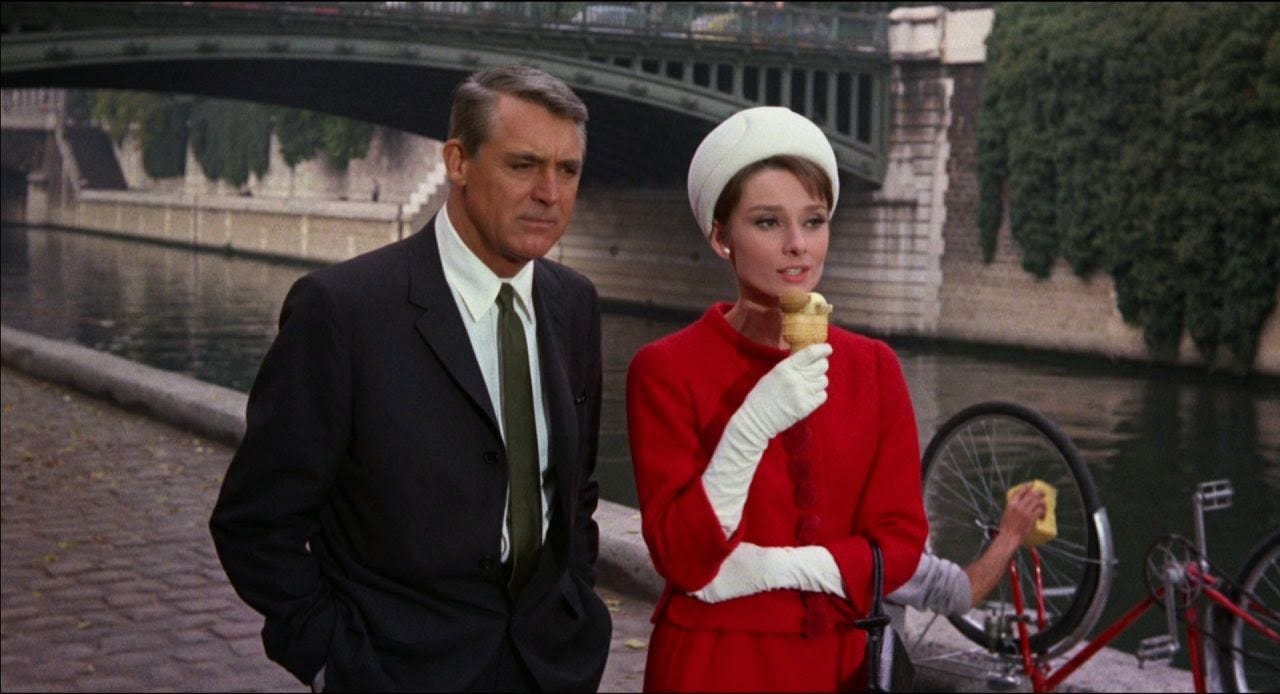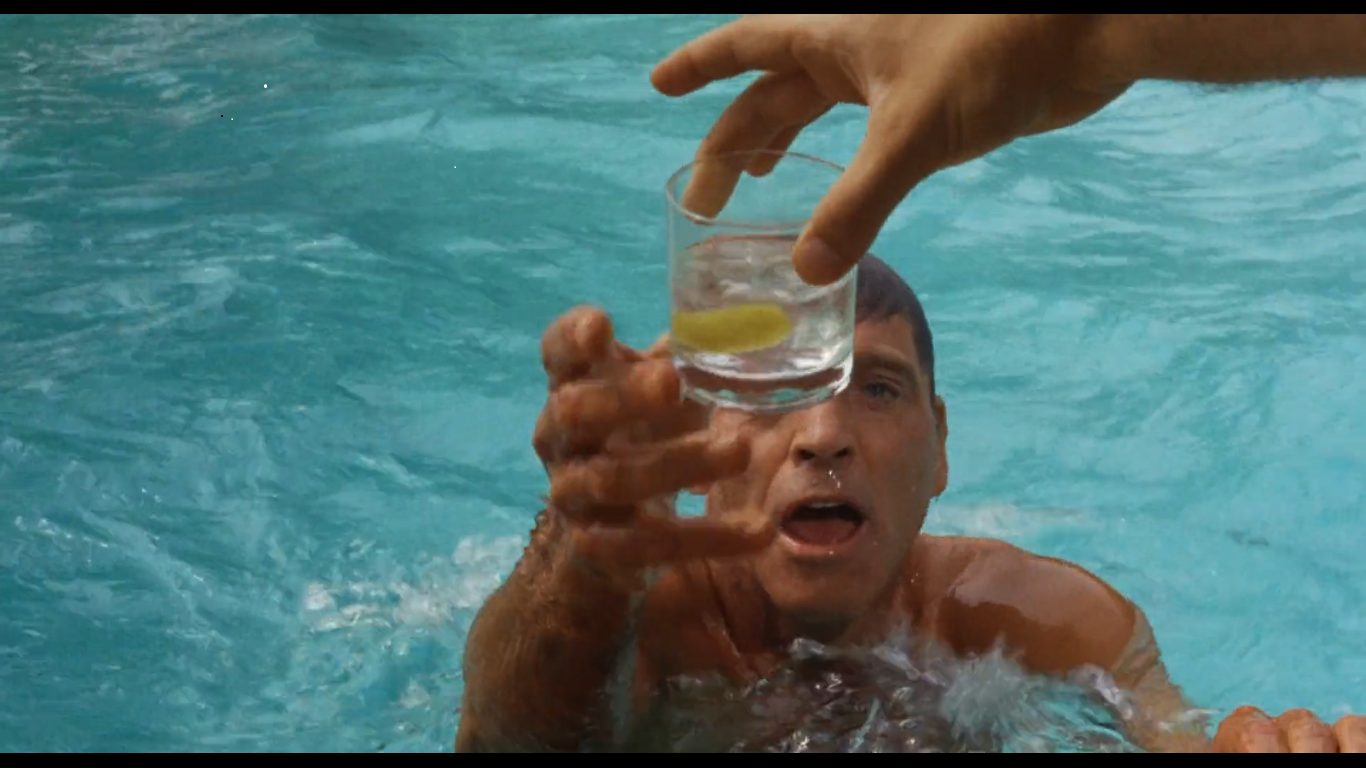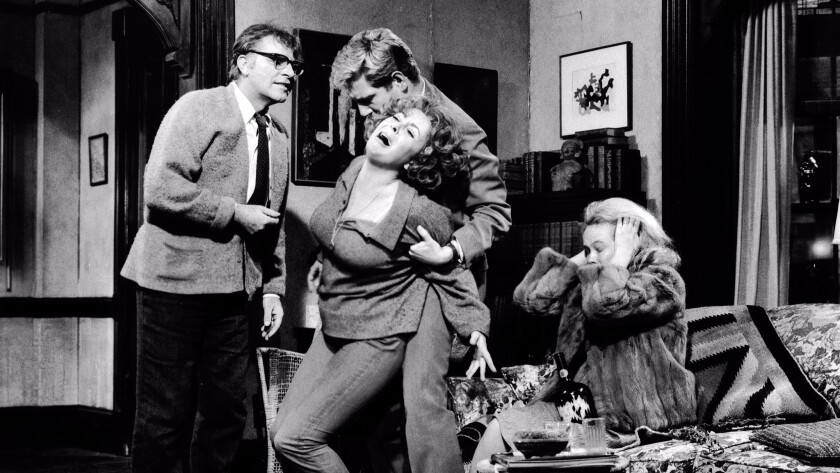We continue with our endeavour, moving into a real turning
point decade for film. We are moving away from the sturdy filmmaking of
industry professionals and veering into more radical work, based around
auteurs. The decade is ultimately most interesting because it still features
remnants of a bygone time, whilst letting the new revolution push its way in.
The below list reflects both periods coming to a head and attempts to list the
15 greatest/my personal favourite films of the decade of the 1960's.
Often described as the greatest Hitchcock film he never
made, this romantic thriller positions both Cary Grant and Audrey Hepburn in
positions where they can do exactly what they are best at. Grant is exuberantly
charming, suave, handsome and hilarious as always, and Hepburn is her regular
faultless self. Both play off each other brilliantly as they traverse Donen’s
brilliant set pieces and Peter Stone’s ever twisting and constantly turning
script. This is an ideal personification of the old phrase “they don’t make
them like this anymore”, and it’s the exact sort of film to make you wish that
they still did.
14. Rosemary’s Baby (Polanski, 1968)
Still as terrifying and haunting now as it was then,
Polanski’s psychological battle with demons and perhaps even Satan himself
still leaves the viewer awe-struck by the time that it’s over. Every
performance is stellar, from John Cassavettes simple but effective turn as
Rosemary’s husband, to Ruth Gordon’s simply perfect horrific turn as Minnie
Castevet. Farrow steals the show, naturally, as delicate and violent in her
performance as the action being presented. Polanski’s work has never imbued
such terror into such normality since and remains the summit of his work in the
medium of horror. However, I must leave the prize for the ultimate zenith of his career
to Chinatown, which we will naturally discuss in next week's article.
13. Kes (Loach, 1969)
Where I’m from, this film has touched more people than you
could imagine. The simple story of young Billy Casper befriending a Kestrel in
a cruel world soars like its titular beast above its one-line plot and tells
the story with such beauty, humour and pain that it has transformed lives and
still brings tears to many eyes. Loach has never been better in his marvellous
direction. David Bradley offers the best child performance of all time, not
just this decade. Brian Glover and Colin Welland (Oscar winning screenwriter of
Chariots of Fire) both steal the show
for long stretches as two of the chief teachers in Billy’s life, offering
hilarity and humanity to a world so painfully bleak that it is sometimes hard
to even look at.
12. Cool Hand Luke (Rosenberg, 1967)
There’s just something about Paul Newman that makes you look
at him and think that the sweat he’s sweating must glide off him like water on
a duck’s back. Nothing can touch him as Luke, the laid back southern man
sentenced to rural prison. I’m not saying I’m much of a rebel, but I do adore
the sub-genre of films based around non-conforming charmers in prison based
situations (The Great Escape and One Flew Over the Cuckoo’s Nest never
go amiss). Frank Pierson and Don Pearce's script is electric and never wastes a
line, such is the case with Stuart Rosenberg who similarly fails to waste a
frame. George Kennedy and Strother Martin offer sterling support, leading to an
Oscar for Kennedy. But the king here is Luke and the king here is Newman and
what a king he is.
11. Doctor Zhivago (Lean, 1965)
The finest of Lean’s epics in my eyes. The most direct of
his work highlights the tragic romance of Yuri and Lara, portrayed
exceptionally well by both Omar Sharif and Julie Christie. Lean perfectly
captures the love caught in the fire of a revolution from Boris Pasternak’s
seemingly un-filmable novel. The supporting cast is really one of the
all-timers, with Tom Courtenay, Alec Guinness, Geraldine Chaplin, Rod Steiger,
Ralph Richardson and Rita Tushingham all offering wonderful performances. An
image that will remain with me forever is that of the house frozen completely
in ice and Lara and Yuri wandering through its perpetually still halls. An
image caught in time forever, from a film of similar timelessness. Pure poetry
on film, punctuated by one of the most painfully ironic and heartbreaking
endings of all time.
10. A Raisin in the Sun (Petrie, 1961)
“The prize-winning drama that warms the screen with its
people and its passions”. Adapted by Lorraine Hansberry from her own all time
classic play, we follow the tale of the Younger family, led by Sidney Poitier
in an absolute star turn that fires a shot of adrenaline so powerful into the heart
of any viewer that we feel every pain and issue in the Younger family’s life.
We see a life affected by intolerable racism, still present in our world, yet
at such a place of social acceptance at the time that the film’s set, that the
ending stand of hope is so powerful and resilient that all the hairs on the
back of your head stand on their ends.
9. The Swimmer (Perry, 1968)
One of the all time underrated motion pictures of all time. Burt Lancaster stars as Ned Merrill as he spends a summer day pleasantly
swimming in as many pools as he can handle, and as he does we see an absolutely
brutal visualisation of a man’s descent
in life. From John Cheever’s masterpiece of short fiction, the husband and wife
team of Frank and Eleanor Perry adapt and direct this tale of morality in the
world of the upper class into a piece of effervescent film. The un-credited work
of Sydney Pollack on the scene shared at the end of film between a worn
Lancaster and Janice Rule, however, is the peak of the film and is a scene so brilliantly
written, performed and acted that we can’t actually believe how far we’ve gone
from the start of the film. I strongly recommend that if you haven’t gone with
Ned Merrill on his trip down the Lucinda river, that you take it as soon as
possible and find out if the tagline fits cause I firmly believe it does. "When
you talk about The Swimmer, will you
talk about yourself?"
8. The Producers (Brooks, 1967) The original comedy classic still stands on its own, with
its musical to me being a more than welcome addition to the Mel Brooks cannon. However, the original film is just as hilarious and sensational and, in parts, even
more so. Zero Mostel and Gene Wilder are both perfect in their respective
roles, but the final production of Springtime
for Hitler really does bring the house down. Perhaps the greatest hindrance to the musical
is the loss of L.S.D., portrayed so hilariously here by Dick Shawn that you
simply can’t imagine the film without him. Kenneth Mars is similarly side-splitting as the original comedic Nazi
Franz Liebkind. An all-round sensational comedy that hasn’t aged a day, nor
lost a single laugh in its fifty years since its release.
7. Dr Strangelove or: How I Learned to Stop Worrying and Love the Bomb (Kubrick, 1964)
The other side of my comedic brain lies firmly with Kubrick
and Sellers in this all time classic of comedy, satire and even the war genre.
The film just never stops, with raucous performance and scene after
performance and scene. Scott and Hayden are both magnificent in their
respective roles, but the natural winner here is undoubtedly Peter Sellers.
Sellers portrays three wholly different roles, all to comedic perfection and
with no end in sight in regards to that comedy being tapped. Every scene that
Sellers is in reeks of genius and overall the film is truly a showcase of his
unnaturally immense talent. But nobody can deny the similarly excellent work of
Kubrick, who excels in the world of comedy and satire, just like he excels in
all the other genres and worlds he ventured into.
6. Psycho (Hitchcock, 1960)
Seen as the film is nowadays such a stone cold horror
masterpiece, people seem to forget how cheap and how big a risk this movie was
to begin with for Hitchcock. It was more or less a pulp B-movie from a schlocky
dime-store paperback about the most horrific murders in recent historical
memory, but in Hitchcock’s hands and with Perkins, Miles and Leigh offering such
wonderful acting work, the film becomes what it became – a stone cold horror
masterpiece. Less is more here and I find that many of my favourite scenes are
not the murder sequences, but rather the quieter moments between characters, my
favourite scene in the whole film being the sandwich scene shared by Norman and
Marion. Overall, the film is timeless and still can scare the pants off anybody
it dares.
5. Who’s Afraid of Virginia Woolf?
(Nichols, 1962)
Edward Albee’s masterpiece of theatre may
indeed be my favourite play of all time and that naturally has a great emphasis on
its positioning in this list. However, Sweet Bird of Youth is my second
favourite play and I wouldn’t dream of putting that film anywhere near the top
100 of any of my film rankings. What makes this film so special and masterful
is Mike Nichols' adaptation of the play to the screen, along with Haskell
Wexler’s impeccable cinematography. Punctuated by the four leads' note perfect
performances, this swiftly lifts from the page and becomes more than its own
beast. The power and punch of the play remains wholly intact, whilst every
cinematic touch and intricate use of expanding the piece leads to a simply
superb 2 hours and 11 minutes of celluloid. Oh, and good God is it funny.
Maybe I’m sick, but I laugh harder at this film than most comedies released
today. Yet, when it comes to the third and final act of this piece (aptly titled
“the exorcism” in the playbook), there is no more vulnerable image ever put on
a screen than Elizabeth Taylor as she recalls a memory that never was. Burton and Taylor are matched more than enough by George Segal and Sandy
Dennis, making this quartet of bitter, booze-ridden vehicles of wit and
vulgarity a more than suitable gang to fill our 5th slot. There will
be more Nichols down this list.
4. Butch Cassidy and the Sundance Kid (Roy
Hill, 1969)
The essayist, author and screenwriter, William Goldman, is one of my great idols and there is no greater distillation of his talent than his Oscar winning screenplay for the 1969 western classic,
Butch Cassidy and the Sundance Kid. The movie is timeless and the two lead performances are still the finest distillation of on-screen charisma available. The Newman love-fest seems to continue. Newman and Redford are the greatest on-screen duo outside of the world of romance, there’s just no argument for me. Though, in regards to romance, Katherine Ross, in the ambiguous three ring circus of the three leads, is similarly excellent. Goldman’s words, through Roy Hill and Conrad Hall’s camera, gives us the greatest western ever put to film (or at least my favourite).
3. West Side Story (Wise & Robbins, 1961)
The greatest musical adaptation of all
time. There. I said it. For me, there is just no competition. Every change is for
the better, every casting is pitch perfect. Robbins brings all of the juice and
flare of the original stage production and Wise brings it into the world of
celluloid like a dream. Natalie Wood breaks your heart into a hundred pieces,
and when she shares the screen with Richard Beymer you believe in true love,
like no other film can make you do. Every dance leads to toe-tapping and
exuberant energy and every word spoken or sung elicits the deepest heartbreak,
or even at points larger laughs than most comedies. With Sondheim’s flawless
lyrics and Bernstein’s God-like score, the film has pretty great material to
start with. But to pair that with Robbins’s work again, Wise’s direction and a
book adaptation from Ernest Lehman...there is only word: perfect. Or genius,
either will suffice.
2. The Apartment (Wilder, 1960)
In 1960, the right film won best picture. Against such films as Psycho, Spartacus, The Magnificent Seven, La Dolce Vita and Peeping Tom, Billy Wilder’s The Apartment won, and more than rightfully so. Sometimes advertising is wrong and sometimes it’s more than misleading, but the tagline for this fantastic film is perfect: “Movie-wise, there has never been anything like The Apartment. Love-wise, laugh-wise or otherwise-wise”. And it’s all true. A sensational Jack Lemmon falls for an effortlessly charming and beautiful Shirley MacLaine, as he rises up the ladder of his work through more than nefarious deeds. C.C. Baxter and Fran Kubelik are a couple of the ages and paired with Wilder’s ingenious comedic and dramatic direction, the film just soars. It also happens to have one of my top five closing lines of all time, in “shut up and deal”. For my others, see my Top Ten blog post.
1. The Graduate (Nichols, 1967)
(Our second swimming pool integral film in this list)
It’s hardly the "boy meets girl"
that we’re used to. As a matter of fact, it’s "boy meets friend of his
mother's, starts affair, ends affair, boy meets daughter of friend of his
mother's, starts affair, friend of mother ends affair, boy stops wedding, boy and girl sit and contemplate the rest of their life". I sometimes
wonder what would have happened if the camera-man had heard Mike Nichols (on the most top form he’s ever been on) say cut and the film didn’t keep with Ben
and Elaine in the back of that bus. I do still think the film would be on this
list, I do still think it would be as acclaimed as it currently is. The ending
would still work as well as it does and the whole hour and half before it would
still be as awkwardly hilarious and brilliantly dark as it has always been, but
the bitter-taste feeling left by that ending, punctuated by just one of Simon
and Garfunkel’s many amazing contributions to the film, leads you to think
about the film for days on end. Or in my case, 8 years on end.
-
Honourable mentions: Peeping Tom, La Dolce Vita, Lawrence of Arabia, 8 ½, Whatever Happened
to Baby Jane, The Pumpkin Eater, Harper, They Shoot Horses, Don’t They?, The Lion in Winter, The Children’s Hour, Long Day’s Journey Into Night.
-
And so concludes
this list of the greatest/my personal favourite movies of the 1960s. In the
next article we will dare to rank what I have always viewed as the finest
decade for film thus far: the 1970s. A herculean task if ever I’ve heard one.
-Thomas Carruthers

















0 Comments